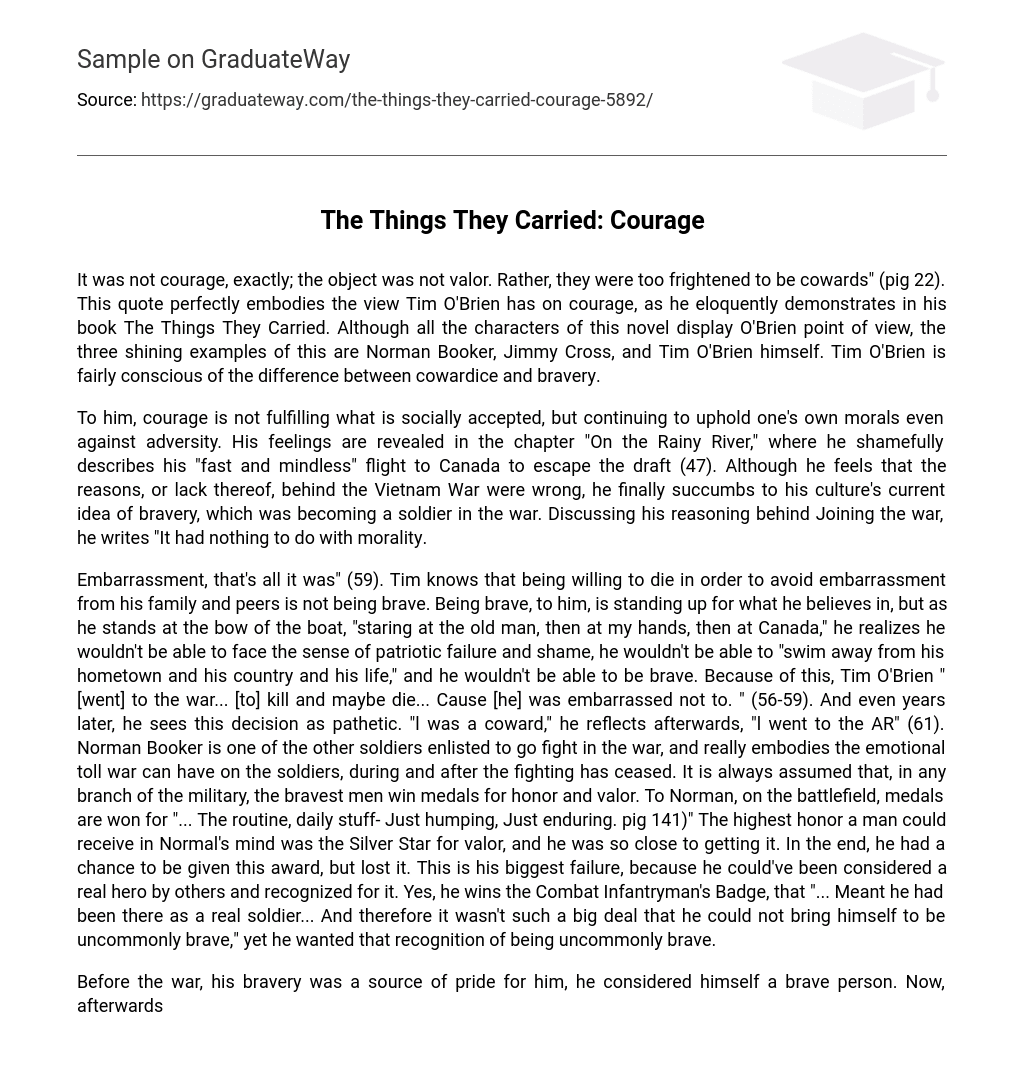It was not courage, exactly; the object was not valor. Rather, they were too frightened to be cowards” (pig 22). This quote perfectly embodies the view Tim O’Brien has on courage, as he eloquently demonstrates in his book The Things They Carried. Although all the characters of this novel display O’Brien point of view, the three shining examples of this are Norman Booker, Jimmy Cross, and Tim O’Brien himself. Tim O’Brien is fairly conscious of the difference between cowardice and bravery.
To him, courage is not fulfilling what is socially accepted, but continuing to uphold one’s own morals even against adversity. His feelings are revealed in the chapter “On the Rainy River,” where he shamefully describes his “fast and mindless” flight to Canada to escape the draft (47). Although he feels that the reasons, or lack thereof, behind the Vietnam War were wrong, he finally succumbs to his culture’s current idea of bravery, which was becoming a soldier in the war. Discussing his reasoning behind Joining the war, he writes “It had nothing to do with morality.
Embarrassment, that’s all it was” (59). Tim knows that being willing to die in order to avoid embarrassment from his family and peers is not being brave. Being brave, to him, is standing up for what he believes in, but as he stands at the bow of the boat, “staring at the old man, then at my hands, then at Canada,” he realizes he wouldn’t be able to face the sense of patriotic failure and shame, he wouldn’t be able to “swim away from his hometown and his country and his life,” and he wouldn’t be able to be brave. Because of this, Tim O’Brien “[went] to the war… [to] kill and maybe die… Cause [he] was embarrassed not to. ” (56-59). And even years later, he sees this decision as pathetic. “l was a coward,” he reflects afterwards, “l went to the AR” (61). Norman Booker is one of the other soldiers enlisted to go fight in the war, and really embodies the emotional toll war can have on the soldiers, during and after the fighting has ceased. It is always assumed that, in any branch of the military, the bravest men win medals for honor and valor. To Norman, on the battlefield, medals are won for “… The routine, daily stuff- Just humping, Just enduring. pig 141)” The highest honor a man could receive in Normal’s mind was the Silver Star for valor, and he was so close to getting it. In the end, he had a chance to be given this award, but lost it. This is his biggest failure, because he could’ve been considered a real hero by others and recognized for it. Yes, he wins the Combat Infantryman’s Badge, that “… Meant he had been there as a real soldier… And therefore it wasn’t such a big deal that he could not bring himself to be uncommonly brave,” yet he wanted that recognition of being uncommonly brave.
Before the war, his bravery was a source of pride for him, he considered himself a brave person. Now, afterwards, he doesn’t have that to hold onto any longer. For the rest of his life, this eats away at him to the point that he chant take it anymore. Lieutenant Jimmy Cross is introduced within the first few pages of the novel along with his views on the war and the soldiers he works with. He never once describes the men in the war as brave or courageous, he actually talks a lot about their fears and the emotional baggage they carry.
The reader soon finds that Jimmy has a girl The Things They Carried: Courage By becomingly be unrequited as Martha treats him as a good friend rather than a potential boyfriend or lover. He describes a night when he had taken Martha to a movie and kissing her goodbye that night after taking her home. “Right then, he thought, he would’ve have done something brave…… He should’ve risked it” (5). This shows how Cross feels that taking risks, even as small as kissing a date goodnight or touching her, are more brave than any mission carried out by the soldiers.
Thoughts of their relationship always occupy Cross’s mind and distract him from his duties. His lack of attention costs one man his life, having lasting effects on Cross’s conscience and gives him an eternal sense of guilt over his actions. This showed how emotionally fragile Vietnam soldiers were and the amount of stress and tragedy being put on them on a day to day basis. Another example of this is when Cross’s fellow soldier, Kiowa, dies in an accidental explosion.
Cross is found squatting in the muck of a lake, almost in a daze, contemplating the death of all those around him and what it means and who is to blame. He tried to tell himself that “No apologies were necessary, because in fact it was one of those freak things, and the war was full of freaks, and nothing could ever change it anyway. Which was the truth, the exact truth. Lieutenant Cross went deeper into the muck, the dark water at his throat, and tried to [convince] himself it was the truth” (176). This symbolizes the breaking point of Cross ND how he really is no longer courageous.
He takes tragedies to heart and feels pain intensely. He is not a strong person, he is broken by the war. In war, they carry a great many personal things, all the way from tranquilizer to M&Ms. Yet there is one thing they all carried, “They carried the soldier’s greatest fear, which was the fear of blushing. Men killed, and died, because they were embarrassed not to” (21). O’Brien uses the characters of Jimmy Cross, Norman Booker, and himself to demonstrate the immense difference between a civilian’s view on courage, and what soldiers realize courage really is.





